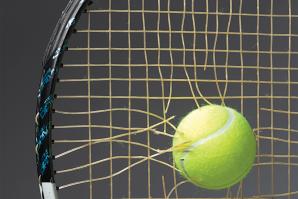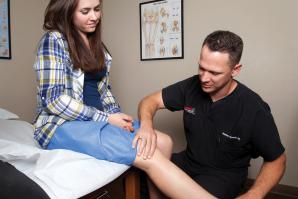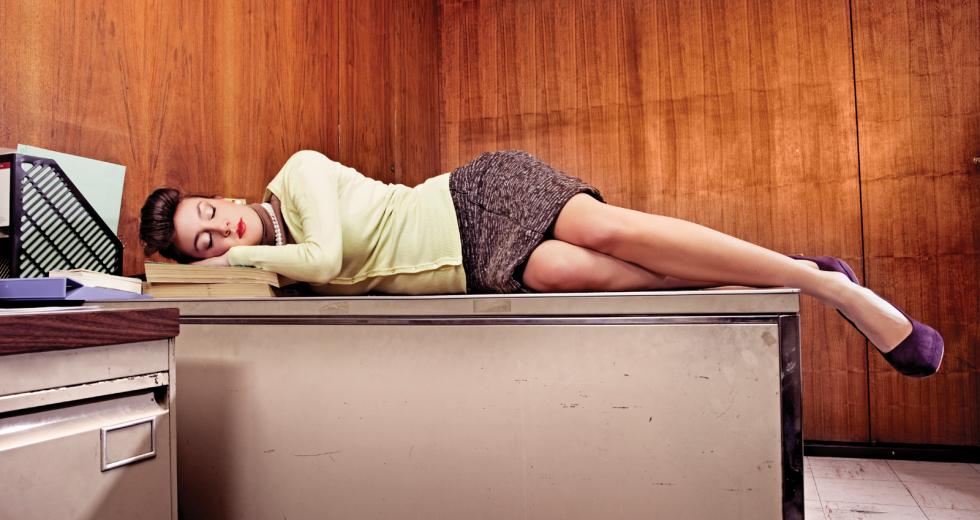3 a.m. Insomnia. I lie in the darkness, too tired to read, too wired to sleep and too stubborn to watch TV. That would be admitting defeat. I can do this.
4 a.m. Still wide awake. I wonder why I’ve just wasted an hour. I consider flicking on my computer, but no, that would mean surrender. I won’t surrender.
4:30 a.m. I surrender. I open Netflix and hunt for something that will make me sleepy. This wakes me up. At 5:45 I finally drift to sleep. At 6 a.m. the alarm goes off.
Then I drink coffee. Lots of coffee. But I’m sensitive to caffeine, so my sleep is interrupted the following night, which makes me guzzle more coffee, which hurts the following night’s sleep, so I drink even more coffee. It’s a vicious cycle, and I’m trapped.
I have an especially stupid case of insomnia, but we as a society are rotten sleepers and I’m not alone. This wasn’t always the case. In the 19th century, when we read by candlelight after an invigorating day on the farm, Americans averaged nearly nine hours of sleep. In the 1960s this plunged to 7.9 hours, and a 2005 study pegged it at 6.9. Since doctors recommend seven to eight hours a night, about half the population is sleep deprived. We’re a nation of walking zombies. Every year, drowsy drivers cause 56,000 accidents and 1,500 deaths.
This is sort of odd when you consider that, in other respects, we’re obsessed with our health. We’ve banned indoor smoking, we eat organic, we jog, we lift weights and we care about things like chakras. On Amazon.com, a search for “diet books” fetches 2,779 results. A search for “sleep books?” Just a meager list of parenting guides and Dr. Seuss. We show a shocking indifference for recharging our batteries.
But I have it relatively easy. Most men do. Gender Inequity No. 862: Women are faced with both cultural and biological impairments to sleep. “Men have less sleep issues than women. Way less,” says Dr. Richard Stack, medical director of the Mercy Sleep Center in Sacramento. “Many women are moms 24/7, and their brains never shut off and they might be working a full-time job, too. For men, when it’s time to go to bed, they hit the pillow and they’re out.”
Economic forces are at play. Happily, we’ve reached a point in society where women can out-earn men, they run companies and, as Hannah Rosin writes in The Atlantic, they “dominate today’s colleges and professional schools.” Not so happily, men haven’t picked up the domestic slack. “Women still tend to bear more responsibilities for the home. She might work all day and then do the washing and the cooking and the cleaning, and she’s likely to be more sleep deprived,” says Dr. Stack. And what about working moms who have draining, on-your-toes-all-day jobs like waitresses, cashiers or teachers? He guesses that more than 85 percent get insufficient shut-eye. “Virtually none of this is recognized by medicine or society. The bottom line is that many women simply need two or three more hours of sleep a night.”
Studies have shown that stress, anxiety and bladder problems all skew higher with women, which takes a toll on the pillow. Depression tends to be more common, and that, in turn, can lead to insomnia, which fuels depression, which fuels insomnia, ad infinitum. And on top of these cultural factors, women’s sleep can be further hampered by a biological wildcard: hormones.
Dr. Lydia Wytrzes, medical director of sleep disorders for Sacramento’s Sutter Neuroscience Institute, says more than 60 percent of women who go through menopause report sleep problems. Hormonal swings can lead to vasomotor symptoms, more commonly known as hot flashes, a sharp, sudden feeling of heat that can jar a person from slumber. “Hot flashes are more likely to occur in the nighttime hours than any other time of day, so this is likely to prevent sleep,” Dr. Wytrzes says.
Reproductive hormones also help guard the body against sleep apnea, a condition in which breathing is obstructed during sleep. So when those hormones dip, women are more likely to wake up from a blocked passageway. Menopause also increases the odds of restless legs syndrome, which causes pains in the calves and, well, restless legs. These issues can be treated with hormone replacement (a low dosage of estrogen) or, when appropriate, birth control pills.
Even in a woman’s 20s or 30s, hormones can cause sleep mischief. “Sometimes women sleep differently during the different parts of their cycle. A lot of women say that when their period starts, they feel sleepier, because they have an increase in progesterone, which is a sleep-inducing hormone,” says Dr. Wytrzes, adding that, “It’s pretty unusual that it is so disruptive that someone would seek medical attention for it.” She’s also quick to point out that while hormones are often the driver of poor sleep during menopause, there’s often emotional and psychological undercurrents. “You don’t just assume that because it’s a 50-year-old woman, it must be her hormones. Maybe her kids have just left home, she just got divorced and she has this new stress in her life.”
Another hormonal curveball, of course, is pregnancy. Surging levels of progesterone hijack the first trimester. “Talk about major hormonal changes,” says Dr. Stack. “There’s major sleep deprivation as you could be worried about the baby, breast-feeding, have problems with urination, have tender breasts, struggle to get a comfortable sleeping position or give up your exercise routine during pregnancy.”
So just why, exactly, does sleep loss matter? Some of the downsides are obvious: irritability, fatigue and watching 2 a.m. infomercials for the George Foreman Grill. We’ve all been there. But sleep debts, when chronic, can trigger health problems that range from cosmetic to fatal. It can dampen our sex drive, scramble our memory. It boosts the risks of strokes, diabetes and heart failures. Researchers analyzed the sleeping patterns of 10,000 Brits and found that when sleep plummeted to 5 hours per night, the risk of death nearly doubled.
And if death isn’t scary enough, here’s something more alarming: It can make you fat.
“Partial sleep deprivation may influence appetitive hormones, such as ghrelin and leptin, that aid in the regulation of appetite and body weight,” wrote the researchers of a Penn State study that found that when we get fewer than six hours of sleep a night, our brains can trick our bodies into thinking we’re actually hungrier than we really are, and the risk of obesity spikes by 30 percent.
Too little sleep can also damage our skin. In times of stress and sleep deprivation, the body boosts its levels of the hormone cortisol. Too much cortisol can ravage the body’s stock of collagen, which gives skin its elasticity and keeps it smooth. Sleep deprivation can also cause fibromyalgia, a disorder in which the body feels excessive pain in tender spots — yet another problem that skews higher with women.
Sleep deprivation is almost certainly more serious than we think. In a study at the University of Pennsylvania, volunteers were asked to sleep for only six hours for two weeks. The results? It depends who you ask. The volunteers said that they felt mildly sleepy but, for the most part, could function like normal.
But when the scientists tested the volunteers’ reaction times and cognitive abilities, they found that the volunteers functioned like people who hadn’t had a wink of sleep in 48 hours. Translation: Sleep deprivation makes us less likely to realize we’re sleep deprived.
Are you getting enough sleep? Probably not. The optimal amount of sleep, according to Dr. Stack, is “as much as you need.” OK, that’s vague. He clarifies that you should get “whatever it takes to fall asleep naturally and wake up naturally.” He recommends thinking of your vacation schedule. When you’re on vacation with no deadlines, no spreadsheets and no alarm clocks, how many hours do you sleep? That’s what you should do all the time.
Every doctor I spoke to stressed the importance of “sleep hygiene,” which, from what I’ve gathered, basically means not acting like an idiot. Most of the elements of sleep hygiene should be familiar to anyone who has used a pillow: Avoid caffeine late in the day, ensure your room is dark, avoid too much booze and nicotine, get exercise, nix the late-night binge eating and, as sleepfoundation.org puts it, “Use your bedroom for only sleep and sex.” A tip you might not have tried: If you’re feeling anxious and stressed, try jotting a to-do list before hitting the sack.
“The real way to tell if there’s a problem — not just a sleep complaint, but a real problem — is if there’s a daytime component to it,” says Dr. Wytrzes. “Do they have problems staying focused at work? Cranky around the family?”
If so, try to determine if the problem is 1) a short-term acute issue, or 2) something chronic. “If someone has a sleeping problem for more than three weeks and it affects the quality of their life, that’s a red flag,” she says
When I describe a bit of my own insomnia, Dr. Wytrzes (patiently) suggests I scrub my sleep hygiene. (Confession: I can’t eliminate the coffee. I pulled off a 5-day juice cleanse for this magazine’s July issue, but a permanent reduction of caffeine? I’m a coward.) But if you are stronger-willed than I am and you’ve ensured that your sleep hygiene is squeaky clean and you’re still having trouble sleeping through the night, then the root cause could be a sneaky underlying health problem.
For better or worse, however, it’s unlikely your insurance company will let you crack the problem by staying overnight at a place like the Mercy Sleep Center. According to Dr. Stack, the insurance companies now insist on a rigorous screening process, and, more often than not, they’ll only accept patients experiencing airway obstruction.
“To get to us these days, the insurance company has probably narrowed it down to sleep apnea, which means other root causes are often going untreated,” Dr. Stack says.
Another option? The homeopathic route. Dr. Dennis Godby, a Sacramento-based naturopathic doctor, says, “When you go to a medical doctor, they might say, Here, take this pill,’ and you’ll go to sleep.” Instead of popping sleeping pills, which Dr. Godby warns can be addictive, his remedies (in addition to traditional treatments such as testing hormone levels and lowering cortisol levels) can include massage and aromatherapy. The goal is to reduce stress, improve overall health and get more sleep. “Part of sleep deprivation is the result of the American lifestyle — the body is not meant to eat crap, not exercise and then sleep like a baby.”
In almost all cases, sleep deprivation is fixable. This isn’t cancer. And it might not take long to right the ship.
“The good news is that these effects [of sleep deprivation] can be reversed by getting an adequate amount of sleep,” writes Dr. Lawrence Epstein, the author of “The Harvard Medical School Guide to a Good Night’s Sleep.” “The University of Chicago study on sleep duration and appetite found that allowing the study subjects to sleep 10 hours for two consecutive nights returned the hormones to normal levels and lowered hunger and appetite ratings by almost 25 percent.”
This means that the onus is on us. In the same way that we make an effort to go to the gym, eat less fat and keep up with Oprah’s Book Club, we need to carve out time to sleep. Our bodies need it, our brains need it. Think of this research as a backed-by-science excuse to spend more time doing nothing.
(And when you figure out how to do this, please tell me.)
Recommended For You

Love Hurts
The pain of learning tennis is more than worth the health gains
It started with a girl. She had played tennis in college. Desperate to impress her, I challenged her to a match. Sure, I had never played, but I could hold my own.

Avoiding the Pop
Why do so many women tear their ACL, and how can they prevent it?
In one of the crueler twists of sports, ACL tears often happen in freak accidents that you can’t really control. Seventy percent occur without contact. Even more cruelly, a woman is four times more likely than a man to tear the ligament — especially if she’s young and active.



